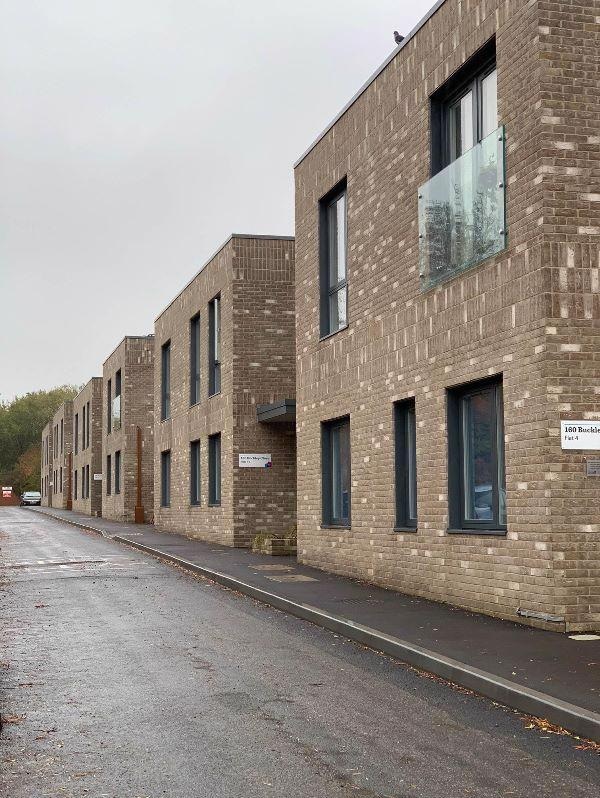New entrant Emergent have today launched a “smart local energy system solution” that connects individual houses and flats with on-site net zero technologies on residential developments through a microgrid.

Image Credit: Emergent Energy
Emergent operate these microgrids - made up of heat pumps, solar PV and electric vehicle chargers - by leasing the equipment from housing companies (developers, homebuilders, landlords and social housing providers), and using it to supply green electricity and heat generated on-site to residents.
By intelligently integrating the equipment with battery storage, big data analytics and algorithms Emergent can cut running costs and reduce residents’ bills. Emergent then offers regular long-term payments to housing companies, from the profit they generate, that can cut 25% off the cost of installing heat pumps and solar PV today, rising to 100% by 2025.
This groundbreaking new business model has been made possible following yesterday’s decision by Ofgem to award Emergent an “Energy Regulation Sandbox”. This is the first ever regulatory Sandbox derogation to parts of the Balancing and Settlement Code which is managed by industry body Elexon. The derogation gives Emergent unique permission to trial a new process that will make it easier and cheaper for households on microgrid networks to switch their energy supplier. This is essential for operating microgrids fairly and cost efficiently in residential developments and will enable new entrant Emergent to trial the switching concept while scaling up its offer for housing companies.
Emergent has helped deliver nine smart local energy systems in housing developments across the country to date. Their new full-service solution was developed with support from Government innovation funding body Innovate UK, and with this Sandbox award is now available for the housing industry nationwide. Leading housing provider Stonewater is one of the first to be in discussions with Emergent, with plans to implement the solution at one of its new affordable developments in the North East.
Reg Platt, Founder and CEO of Emergent, said: “The ban on gas boilers for all new homes from 2025 and the requirement for all social housing and rented accommodation to be EPC C rated by 2030 will require the housing industry to spend hundreds of billions to drastically cut emissions from their housing developments.
To stand a chance of delivering net zero housing, developers need to generate investible returns on infrastructure spending, and the benefits from installing the technology cannot be limited to households in particular tenures or locations. If not, the costs will simply be passed on to customers or taxpayers, and there will be increasing public pressure to abandon the targets, which will be hard to resist.
Our integrated model provides a return on investment to housing companies and shares the benefits of the technologies across households that would otherwise not be able to afford it. At the same time we ensure the new technologies are efficiently integrated into the national electricity system by balancing electrical supply and generation loads locally, which reduces pressure on the national grid.
Yesterday’s derogation award, coupled with the support from Innovate UK to develop our offer, shows there is a willingness to update market rules to unlock the immense potential of smart local energy systems. This shows that when innovators, regulators and governing bodies work together, we can deliver practical net zero solutions that save everyone money rather than costing the earth”.
Anna Rossington, interim Director of Retail at Ofgem, said: “All consumers should be able to switch energy supplier and benefit from cheaper bills irrespective of where their home happens to be. We’re pleased that the Regulatory Sandbox will give Emergent the flexibility to trial a new approach that could help consumers on private electricity networks – many of whom may be living in vulnerable situations – get access to the full range of deals available to other energy shoppers.
“As the energy system transitions to net zero, Ofgem is allowing innovators to experiment and bring new propositions to market that create value and benefit for consumers. The Sandbox is open to start-ups, new entrants, established sector players, public or third sector bodies, supporting innovations from the research and development phase to those ready for launch.”
Rob Saunders, Challenge Director for the, “Prospering from the Energy Revolution” programme at Innovate UK (part of UK Research and Innovation) that has supported Emergent with funding, said:
“We’re delighted that this new proposition has been developed with the support of Government funding through UK Research and Innovation, designed to accelerate innovation in smart local energy systems. Regulatory arrangements can be restrictive for businesses wanting to trial and scale new ways of delivering local energy solutions, so it's fantastic to see Ofgem allowing companies to innovate in this space to benefit customers.”
Mark Bygraves, Chief Executive at Elexon, said: “It is great news that Ofgem has approved Emergent’s proposal to use the Regulatory Sandbox, which offers a safe space for companies and innovators to trial new concepts and ideas. To meet the net zero challenge we need to support new ways to decarbonise, and help consumers to play a more active role in the energy market.”
“Emergent is the first company to benefit from a derogation specific to the Balancing and Settlement Code within the wider Regulatory Sandbox, but we are hoping it is the first of many, as innovators begin to look to trial new market models in the electricity industry, on the road to net zero.”
Patrick Chauvin, Executive Director of Assets at Stonewater Housing, said: “We can see the impacts of global warming around the world and we know that the clock is ticking down. At Stonewater we want to lead the charge in decarbonising social housing and tackling fuel poverty, which is why we’re exploring innovative ways to make our new and existing homes energy and fuel efficient. Emergent’s new commercial offering will enable us to invest in net zero solutions at reduced costs, supporting our efforts to reduce carbon emissions whilst also providing cost savings for our customers.”